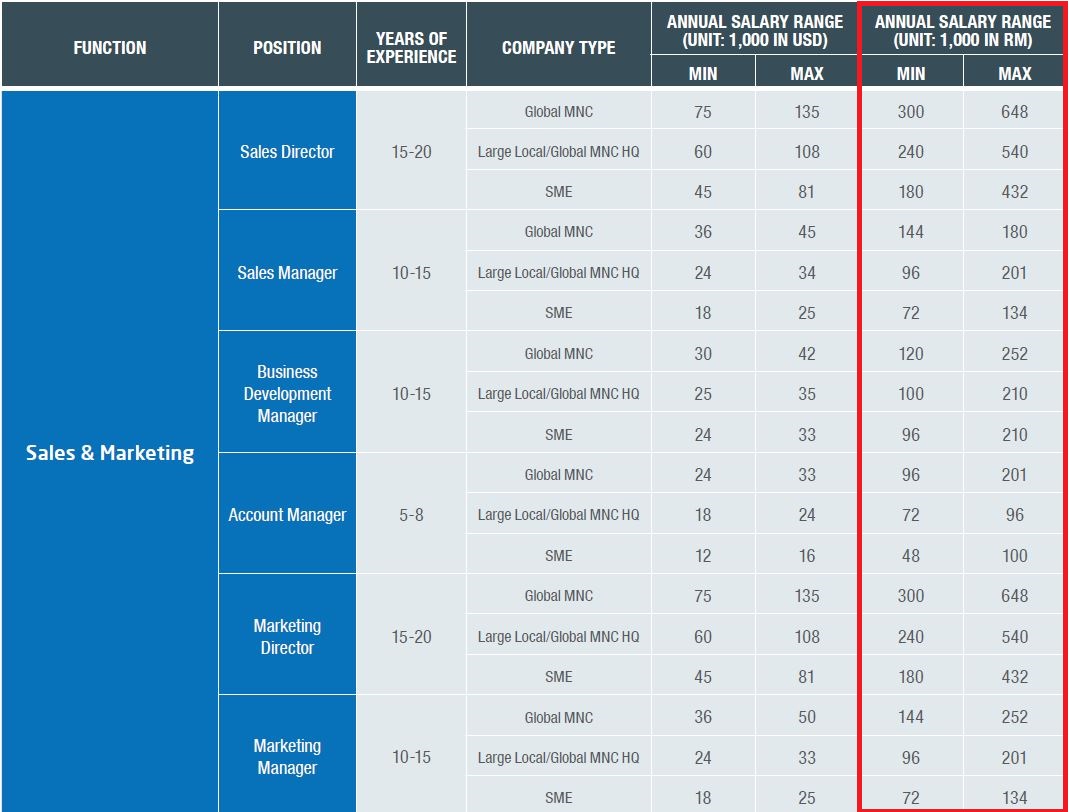The COVID-19 pandemic has caused Malaysia to experience limited export growth in Q1 2020 due to its close business partnerships with mainland China.
While this will surely impact the economy throughout the first half of the year (and maybe longer), the government’s stimulus package is expected to keep the economy afloat to a certain degree.
When workforce productivity returns to normal in Malaysia, the adoption of IR4.0 is expected to pick back up with many sectors getting automated and the demand for tech-savvy job candidates increasing.
These are a few of the highlights from RGF Executive Search’s latest Salary Watch: Malaysia report, where they look at salary trends and data across all industries and job levels in Malaysia.
The following data is based on information from 90,000 candidates in their Malaysia database, collected from February 2019 to February 2020.
Malaysia’s “Hot Jobs” & How Much They Pay
RGF Executive Search’s report breaks down these hot jobs into function, position, years of experience, company type, and annual salary range in both US$ and RM.
Their definition of annual salary range refers to basic salary, not including allowance, stock, bonus or any other additional benefits, and the exchange rate used is US$1 = RM4.
The hot jobs are highlighted in blue, and for your viewing ease down the line, the salary ranges in RM have a red border.
1. Industrial – Smart Manufacturing
2. Technology, Internet & Telecommunications
3. Financial Services (Front Office)
4. Financial Services (Middle Office)
5. Financial Services (Back Office)
6. Healthcare and Life Science
7. Consumer Goods & Retail
8. Media, Advertising & Entertainment
9. Corporate Services
Where Is Malaysia’s Job Market Headed Towards?
The outbreak will change careers and the lives of many of us for the foreseeable future, therefore we anticipate the employment market and what are considered hot jobs will be skewed towards sectors that will help the business community adapt to the new norm.
Ai Ling Lee, Managing Director of RGF Executive Search Malaysia.
According to Ai Ling, there will be a rise in the need for new skill sets that include specialised knowledge and experience in sophisticated technology.
Companies moving towards IR4.0 are adopting advanced technologies likes Internet of Things (IoT), AI and machine learning to automate processes and increase productivity.
This in turn leads to the need for businesses to upskill their workforces and seek out talent with knowledge and experience in engineering, data analysis and robotics.
Internet banking across Malaysia was also close to a 100% usage rate at the end of 2019, according to Bank Negara, so mobile banking tools such as fintech, insurtech, blockchain and crowdfunding are gaining momentum.
With the expansion of the mobile banking industry comes cybersecurity, so there will be an increase in demand for cybersecurity specialists and data scientist roles to protect customer information.
Beyond highly technical jobs, however, companies will also be looking for candidates with a wealth of experience in business transformation and knowledge of the local market to upskill and reskill employees.
What Talents Look For In Employers, And Vice Versa
RGF Executive Search highlighted that candidates in Malaysia look at more than just salary when evaluating whether or not to accept an offer.
67% voted that the opportunity to expand their knowledge and skills was more important than salary increments (65%), and 47% said the position title and responsibilities mattered too.
Other factors in their decision include the opportunity to grow with the company, the type of leadership style, and the level of work-life balance they would be afforded.
Additional benefits that talents look out for include:
Meanwhile, employers prioritise relevant knowledge and experience, adaptability, and culture fit when hiring.
Based on the report’s findings, companies in Malaysia would be wise to focus on strengthening their employer branding, reevaluating their talent strategy and tailoring it to current trends, and ensuring compensation packages are competitive in order to attract talent.
- You can read more about what jobs will be high in demand after COVID-19 here.
- If you’d like to see the full report, you can register to download it here.
Featured Image Credit: Unilever / LWE
